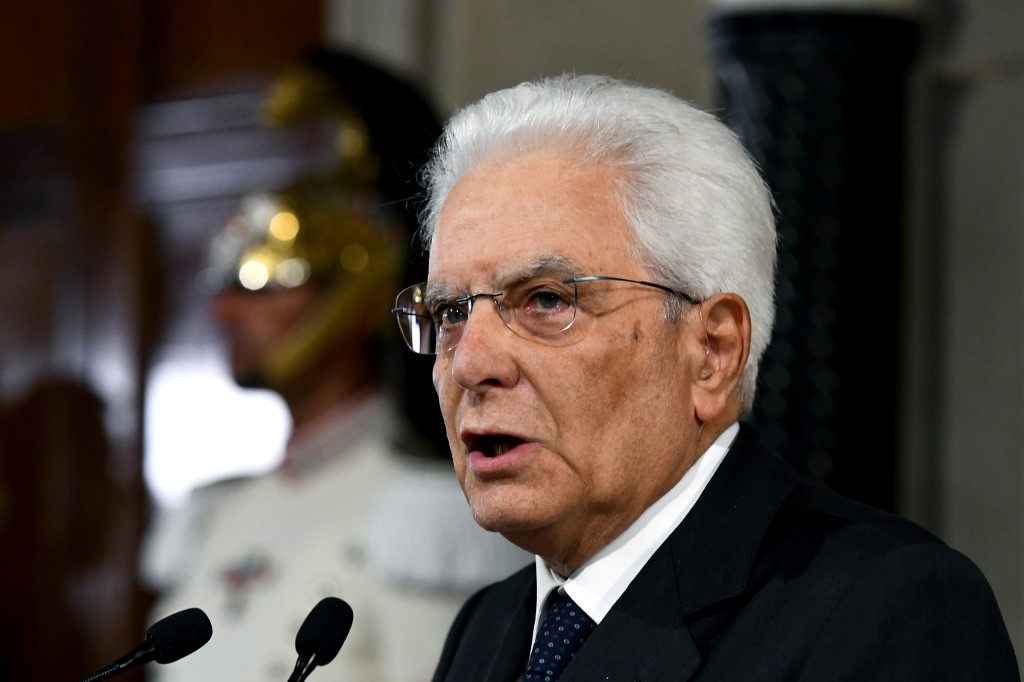ROME, Aug. 24 (Xinhua) - It is still far from certain what the makeup of Italy's next government will be. But the challenges the next government will face are far clearer.
Italy is in the midst of a series of government consultations hosted by Italian President Sergio Mattarella, aimed at finding a path to a new government.

Italian President Sergio Mattarella gives a statement to journalists at the end of the second day of consultations of political parties, on August 22, 2019 at the Quirinal palace in Rome. (Photo: AFP)
There are multiple scenarios for a new government, including a new government supported by same two parties as the last government, the populist Five-Star Movement and the nationalist, anti-migrant League; a new coalition between the Five-Star Movement and the Democratic Party, the center-left party now in opposition; a technocrat caretaker government led by a non-political figure; or a call for new elections that would remake parliament.
While deliberations are ongoing, the collapsed government of Prime Minister Giuseppe Conte will remain in place in a technical capacity, but without power to make policy changes.
Whatever path is eventually taken, analysts said, the next government will face a series of pressing challenges involving mostly revolving around the country's slow-growing economy. That means it must find a way to incentivize economic growth while also reducing the largest public debt in the European Union without raising taxes.
According to Lorenzo Codogno, founder and chief economist of LC Macro Investors Ltd., and a visiting professor at the London School of Economics, a new government would need to find an extra 23 billion euros (25.6 billion US dollars) right away in order to avoid increasing the country's value-added tax by 3.2 percentage points. If the next government includes the League, it would need to find an additional 25 billion euros (27.9 billion US dollars) to finance tax cuts.
"A center-right coalition (led by the League) would be much more cohesive" than a government based on an alliance between the League and the Five-Star Movement or the Five-Star Movement and the Democratic Party," Codogno told Xinhua. "But that would present its own challenges, especially in terms of fiscal discipline."
Alessandro Polli, a professor of statistical economics at Rome's La Sapienza University, said avoiding the automatic increase in the value-added tax should be the new government's top priority.
"Raising the (value-added tax) from 22 to 25.2 percent would have immediate implications across the board, for every Italian, further slowing economic growth and ultimately making it more difficult to keep the deficit under control," Polli said in an interview. "The new government should explore whatever avenues it needs to avoid the increase."
That is a challenge because the increase will come into force automatically on Jan. 1, 2020, unless the extra revenue Codogno mentioned is found.
What will make matters most challenging is that the new government will immediately be thrown into negotiations for the country's 2020 budget. Last year, Italy locked horns with the European Commission for eight weeks over the size of the 2019 budget deficit. Considering the fact that Italy failed to deliver on its promises in the 2019 budget, analysts said negotiations could be far tougher this time around.
Codogno said there is a possibility that a new government could delay the implementation of the value-added tax for a few months and possibly ask for more time to finalize the budget. But other analysts noted that doing those things would represent their own set of challenges for a new government.


